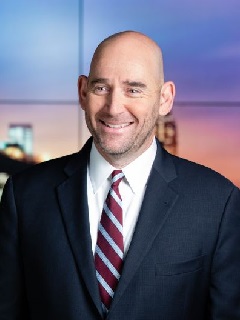KPMG hosted a cross-industry group of chief financial officers (CFOs) to discuss uncertainty across the economic landscape, particularly in the areas of labor and wage inflation. Carl Carande, global head of Advisory, hosted the call, and Tom McMakin of Profitable Ideas Exchange facilitated. Robert Kahn, Eurasia Group’s director of Global Strategy, joined to present to the group his overview of the global risk landscape.
Discover more insights for the modern CFO
Keep up-to-date with a wide range of news, insights, and unique perspectives that have been expertly tailored to fit the needs of the modern CFO.
1
Economic overview
Robert Kahn of the Eurasia Group provided an overview of the current economic landscape, identifying four “pillars of risk”: COVID-19, supply chain disruptions, U.S. political initiatives, and world affairs.
On COVID-19, he sees the possibilities of fall peaks in infection rates but warned that the pandemic should be increasingly viewed as an endemic force in the world. Economically, COVID-19, is largely a supply issue, complicating supply chains and disrupting workforces. Demand, on the other hand, has continued unabated. Kahn noted that the United States seems to be learning to start to live with COVID-19. In his view, as long as hospitalizations and deaths, in contrast to case counts, remain low, we will likely see an economy that really wants to get back to some sort of a “new normal.”
While the vaccine mandate from the Biden administration is politically contentious, Kahn cited the example of France’s Macron and the positive effect of vaccine mandates in Europe. While some countries in Asia are implementing increased strictness around vaccination requirements, it will be an interesting geopolitical trend to watch whether or not certain populations fundamentally accept stricter policies. With many countries out there with no COVID-19 strategies, there are many political and economic risks at hand from which the U.S. won’t be immune.
The New York Fed has seen an unprecedented wage increase across economic sectors. There are still questions around how much of this revolves around lack of willingness or interest in certain work, and whether higher wages will be a sufficient lure for workers to return. There are other questions around whether this is COVID-19-influenced, or whether there are contingent factors (e.g., people simply don’t want to take the subway right now, or don’t have childcare, etc.).
Supply chain disruptions continue to be front and center for the business community. Virtually every corporate client call Kahn has attended has focused on the depth and persistence of supply chain disruptions. He described a world in which companies increasingly seek to inventory supply reserves to buffer against the effects of disruption as well as efforts to diversify supply channels.
Uncertainty continues to define U.S. politics as well. There are two spending bills—the core infrastructure bill and what he called the partisan safety net bill—that will likely pass in the coming months, albeit, in the second bill’s case, scaled back from $3.5 trillion to just north of $2 trillion. He puts the odds of passage of both bills at 80 percent. He pointed to the fight around whether or not to raise the debt ceiling as a greater risk, pointing to early October as the time when the federal government might or might not shut down. Government closure would ripple across the economy and give rise to a host of known and unknown economic consequences.
He noted that there is substantial bipartisan agreement that both of these large spending bills need to be paid for with increased federal revenues, most of which will likely come from increases in taxes, fees, savings, and revised estimated revenue projections. He noted that the “debt doesn’t matter” school of economic thinking was losing sway on Capitol Hill.
Internationally, he noted that Treasury Secretary Yellen has been pushing for a minimum global tax which has garnered strong international support, though there are more countries that need to sign on to the concept before it can begin to find its way into policy.
Finally, Kahn pointed to what he sees as a rising risk, namely, the uncertainty around who will be on the Fed. He said there will likely be changes in the composition of the Board that may or may not have policy consequences going forward.
Internationally, Kahn argued that we are living in an increasingly bipolar world with two economic superpowers— the U.S. and China—even as there continues to be military asymmetry between the two countries. He sees this a relatively stabilizing force in the world—less stable than a world characterized by a single superpower, but more stable than one with many, smaller powers. While once there were predictions of convergence between the Chinese economic sphere of influence and the U.S.’s, increasingly he sees these © 2021 KPMG LLP, a Delaware limited liability partnership and a member firm of the KPMG global organization of independent member firms affiliated with KPMG International Limited, a private English company limited by guarantee. All rights reserved. The KPMG name and logo are trademarks used under license by the independent member firms of the KPMG global organization. NDP243402-1A two ecosystems diverging with separate supply chains, channels, regulations, and standards. This will give rise to tension and conflict between China and the U.S., but with the military asymmetry, there’s a very low likelihood of some sort of real conflict on Taiwan, or in the South China Sea in the near term.
2
COVID-19 and labor
Vaccine mandates and labor challenges: Among CFOs on the call, almost everyone began bringing people back into the office at some point in the summer and then had to scale back once the variant numbers started coming in. Participants agreed it’s easier to require the vaccine across the board than to do weekly testing. Rural communities in particular are struggling with staffing and the threat of losing workers if they put a mandate in effect because workers will leave for other manufacturing facilities in the area. Weekly testing remains a burden in the meanwhile, with no real end in sight unless an across-the-board vaccine mandate is put in place.
Participants across sectors have been burdened with absenteeism due to positive tests of asymptomatic people as well as the need for quarantining and contact tracing. One CFO reiterated the struggle in rural locations, particularly in manufacturing, to simply get workers to show up. Because they have products on allocation, they have at times been forced to shut down production because they can’t get enough people to work. The feeling among participants is that these circumstances are affecting staffing levels across the economy, and therefore, productivity across the economy.
Organizations from both the blue-collar and white-collar sectors share in these struggles, seeing impacts from both a cost perspective and a talent retention perspective. One participant with what is considered an “essential workforce” shared that they have had a hard time maintaining a sufficient driver population. They fear that if they enforced a vaccine mandate, then drivers would simply find a different employer or line of work. Additionally, the CFO reported losing drivers to the gig economy and companies like Amazon.
3
Rising wages
Wage inflation: While noting the impacts of COVID-19 on the world of commerce via supply disruptions, the larger effects reported from the group revolved around unprecedented wage inflation. There is a sense that higher wages are not a temporary phenomenon, but likely a permanent reset for a large number of positions across the economy. Adding to the labor struggles, rural manufacturers are now competing against McDonald’s and similar companies offering positions starting at $15 an hour. This has resulted in a large portion of young people looking at production work differently than in previous economic environments.
The group agreed that they don’t anticipate forecasting for a post-COVID-19 environment, but rather for how to continue indefinitely with the reality of COVID-19. To address the wage inflation issue, one CFO sees the need to better court the age bracket of millennial workers. To do so, companies have to find a way to provide a work/life harmony that aligns with the expectations of that demographic. Additionally, companies need to review the totality of benefits which they can offer rather than simply trying to offer higher wages, which at some point becomes unsustainable. Efforts to this end include maintaining a positive sense of culture for the company, especially for the remote workforce, and providing learning and development programs for professional development.
View additional CFO Peer Exchange Highlights
Dive into our thinking:
CFO Peer Exchange Highlights – September, 2021
Download PDFExplore more
Meet our team

Subscribe to CFO Real Insights
Discover KPMG CFO Real Insights, designed to help improve business performance across the enterprise and in your finance organization.

